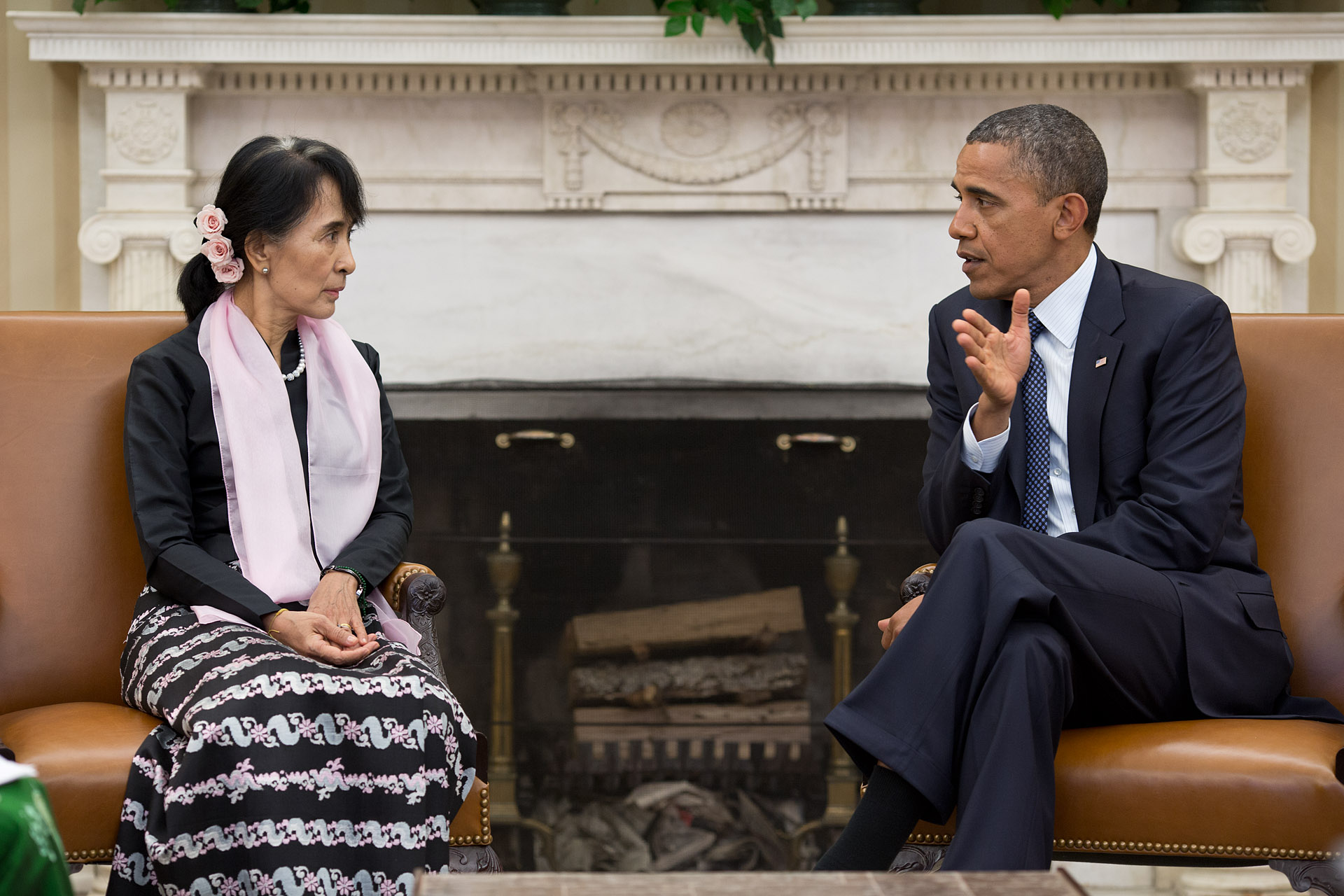This article is a part of a series written by the Culture staff of the HPR. It is the product of discussion and debate at our weekly meetings, and reflects the opinions of the members present.
Aung San Suu Kyi, once lovingly referred to as “Myanmar’s Nelson Mandela,” has recently fallen from the international pedestal that she has occupied since winning the Nobel Peace Prize in 1991. The former political prisoner’s ascension to de facto leadership in 2012 was celebrated then as a victory for nonviolent resistance and peaceful democratic transition, but her public image has been tainted by her silence regarding the ongoing ethnic violence against the Rohingya Muslim minority in the Rakhine State. And while media coverage of the crisis has spiked in recent months, the mistreatment of the Rohingya and Aung San Suu Kyi’s unyielding silence are nothing new. It should come as no surprise, then, that the Harvard Foundation for Intercultural and Race Relations’ decision to honor her with the Humanitarian of the Year award last September was met with protest from members of the Harvard Islamic Society and other allied students. Their concerns, though, were largely ignored; Aung San Suu Kyi was bestowed with the award in a room packed with students and professors eager to celebrate her accomplishments as a champion of democracy and progress.
One year after the controversial ceremony, criticism of Aung San Suu Kyi has reached mainstream media, and her ongoing refusal to even acknowledge the violence has generated a deep sense of disappointment, as well as fear that the struggle will escalate into a textbook case of ethnic cleansing reminiscent of conflicts in places like the former Yugoslavia and Sudan. With mixed feelings regarding the conflict—and the significance of Harvard’s role in lionizing the leader in the midst of this violence—the HPR’s Culture Board gathered to discuss the weight of the award and others like it, and what action Harvard should take, if any, to address or denounce her inaction.
A small poll at the beginning of the discussion revealed that, from the get-go, a notable majority of us felt the award should be revoked. Those expressing this opinion emphasized two unique characteristics that they argued set this award apart from others like the Nobel Prize: timing and language. The Harvard Foundation’s recognition of Aung San Suu Kyi is uniquely troubling, they argued, because it was presented in 2016, after criticism of her silence in the face of ethnic cleansing had already been raised by human rights advocates and members of the Harvard community alike.
We then looked to the language of the Humanitarian Award itself and what it aims to celebrate. Some argued that the term humanitarian necessarily makes this an award of holistic judgment—to be a humanitarian is not just to create positive change, but to live one’s whole life in a manner consistent with respect for human dignity and human rights. The mission of the foundation, after all, is to “improve relations among racial and ethnic groups within the University and to enhance the quality of our common life.” The notion that a group tasked with fostering ethnic coexistence on campus would recognize a figure who has consistently failed to denounce ethnic cleansing as someone representative of the its values, then, felt particularly disturbing.
Not everyone, though, was convinced by this argument. Some asserted that to revoke the award would be to assign a disproportionate level of blame to one individual in an extremely complicated situation—in the case of Aung San Suu Kyi, transitional leadership over a particularly fragmented and historically violent nation. Opponents of revocation emphasized that the international community has largely overlooked the difficult situation Aung San Suu Kyi has been placed into with her recent election, burdened with balancing the need to hold together a country in the infant stages of democracy with the maintenance of basic human rights. To revoke the award, these students felt, was to abandon her in this endeavor, and to endanger her ability to maintain democracy in Myanmar.
Despite our disagreement over the specific course of action Harvard should take now, the board stands in full agreement that Harvard should not have awarded Aung San Suu Kyi the Humanitarian of the Year honor in the first place. And so, even if the award is not revoked, we are left with several important takeaways. The Culture Board feels strongly that the Harvard Foundation should transition towards a significantly more transparent and public process of deliberation, as the relatively secretive nature of the foundation’s decision-making increases the likelihood of making mistakes like this again. If the award is to, as the foundation says, honor individuals “whose works and deeds have served to improve the quality of our lives and have inspired us to greater heights,” these decisions should be made openly and honestly. As a representative of the ideals and beliefs of the Harvard community, the foundation has a responsibility to allow for debate and discussion about who should receive this prestigious affirmation of humanitarianism. For now, however, the Harvard Foundation maintains steady silence regarding their decision—like Aung San Suu Kyi’s, it may prove deafening for Muslim students on campus whose concerns remain unacknowledged.
This week’s CulturEd was written by staff writer Katie Weiner. Members Lauren Anderson, Esteban Arellano, Hadley DeBello, Peyton Dunham, Lauren Fadiman, Savitri Fouda, Yash Kumbhat, Chloe Lemmel-Hay, and Russell Reed contributed to the discussion.
Image Credit: Pete Souza/Whitehouse.gov
